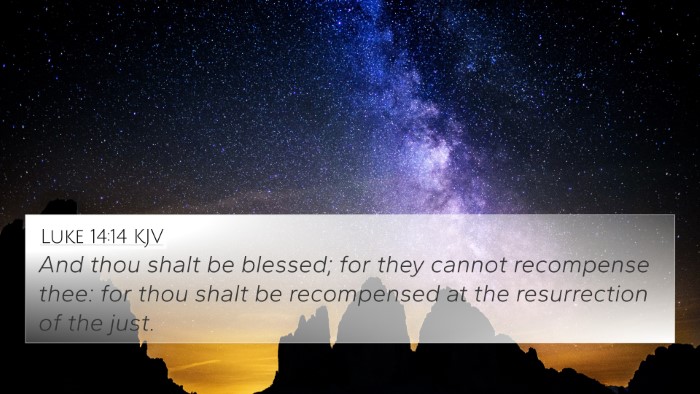Understanding Matthew 6:4
Verse: "That your alms may be in secret: and your Father which seeth in secret himself shall reward you openly." (Matthew 6:4)
This verse emphasizes the importance of humility and sincerity in charitable acts. It teaches that God values our intentions over public recognition.
Summary of Key Insights
- Act in Secrecy: Giving should be a private matter between you and God, rather than a public display for admiration.
- God's Knowledge: The verse reassures believers that God is aware of their private acts of kindness and will reward them.
- Contrast with Public Deeds: Jesus contrasts sincere giving with the hypocrisy of those who seek acclaim through their charity.
Commentary Insights
Matthew Henry: He points out that genuine acts of charity are pleasing to God when performed discreetly. The reward mentioned is both in this life with God's blessings and in the life to come.
Albert Barnes: Barnes emphasizes that the "openly" mentioned refers to the visible blessings that God provides as a result of one's sincerity. The focus should not be on earthly accolades but heavenly rewards.
Adam Clarke: Clarke notes the spiritual implications of secret giving, stating it leads to a purer form of piety. He underlines that God's methods of rewarding may not always be immediate or evident in the way humans expect.
Bible Cross-References
This verse can be cross-referenced with several other scripture passages that enhance its meaning and provide deeper insights:
- Matthew 5:16: "Let your light so shine before men, that they may see your good works, and glorify your Father which is in heaven."
- Luke 14:13-14: "But when you give a feast, invite the poor, the maimed, the lame, the blind: And you shall be blessed; for they cannot recompense you: for you shall be recompensed at the resurrection of the just."
- Proverbs 19:17: "He that hath pity upon the poor lendeth unto the LORD; and that which he hath given will he pay him again."
- Hebrews 6:10: "For God is not unrighteous to forget your work and labor of love, which ye have showed toward his name, in that ye have ministered to the saints, and do minister."
- 1 Corinthians 13:3: "And though I bestow all my goods to feed the poor, and though I give my body to be burned, and have not charity, it profiteth me nothing."
- James 1:27: "Pure religion and undefiled before God and the Father is this, To visit the fatherless and widows in their affliction, and to keep himself unspotted from the world."
- 2 Corinthians 9:7: "Every man according as he purposeth in his heart, so let him give; not grudgingly, or of necessity: for God loveth a cheerful giver."
Thematic Connections
Matthew 6:4 resonates with several themes prevalent throughout the Bible:
- Humility: The importance of humility in all actions, especially in acts of service.
- God’s Awareness: Highlighting that God sees beyond our outward actions to our hearts' intentions.
- Rewards for Sincerity: The assurance that sincere acts please God and will not go unnoticed.
Practical Applications
Understanding Matthew 6:4 offers practical applications for modern believers:
- Simplicity in Giving: Encourage followers to give anonymously wherever possible.
- Heart Check: Regularly evaluate motivations behind charitable actions.
- Encouragement of Others: Foster an environment where good deeds can flourish without the need for recognition.
Conclusion
Matthew 6:4 serves as a guiding principle for how we conduct our charitable acts. It calls for sincerity over showmanship, reminding us that God's reward is far more fulfilling than any earthly recognition. By reflecting on this verse and its connections to other scriptures, believers can deepen their understanding of how acts of faith are rewarded and what true charity looks like. Through thoughtful cross-referencing and thematic exploration of the Bible, we can enhance our spiritual growth and understanding of God’s expectations.



















